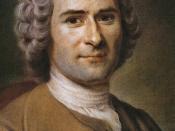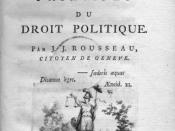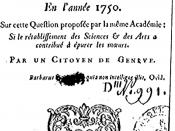During the 17th Century, a fundamental shift in political thought began to occur within Europe. People began to grow disenchanted with the longstanding notion of divine right placed on their kings, ordained through the religious elite in power. In light of this, philosophers from the era started to look at new ways in which to understand the relationship between the individual, society and nature. Of particular importance was Jean-Jacques Rousseau's political doctrine regarding the 'social contract'. Built upon the theories of Thomas Hobbes, Rousseau called for a system whereby society would, for one, effectively be ruled by a government whom had attained authority through a willing consent on the part of the people, and not through religious authority as the convention had been in the past. In his attempt to explain the complex existence of man and his relationship to the world, Rousseau theorized that in the State of Nature (the state of man's harmony with nature, devoid of any structured social system), people were born good but soon turned corrupt due to their interactions with society and social expectations.
Furthermore, Rousseau believed that, while the State of Nature allowed man to have natural liberty allowing him free license to do as he pleased, he was constrained by the very fact that his fellow man could just the same rob him of his possessions if the aggressor was physically stronger than he. Thus, while man was technically a free being, he did not truly have freedom. In realisation of this, Rousseau developed his now famous quote, "Man is born free, and everywhere he is in chains" (1988, p.17). To rectify this tragic state of affairs, Rousseau proposed a 'social contract'. Since man needed to have social relations with his compatriots for the purposes of his own self-preservation, Rousseau's theory proposed...



Fantastic essay
this was a really well written and awesome essay, nice flow, great presentation of arguments, helped me a lot while studying, thank you for posting
0 out of 0 people found this comment useful.